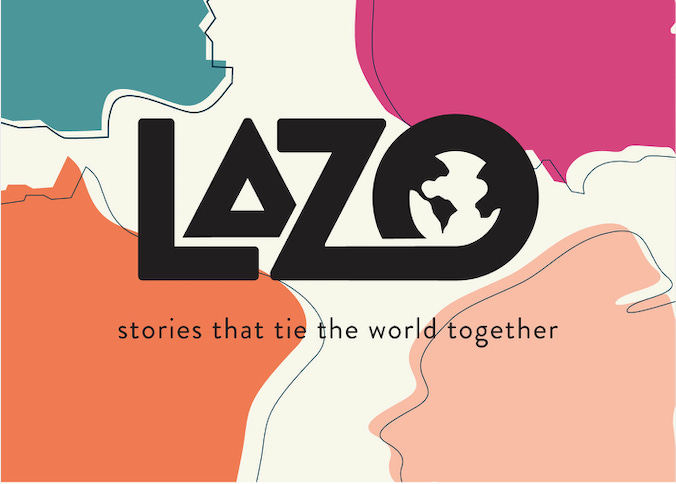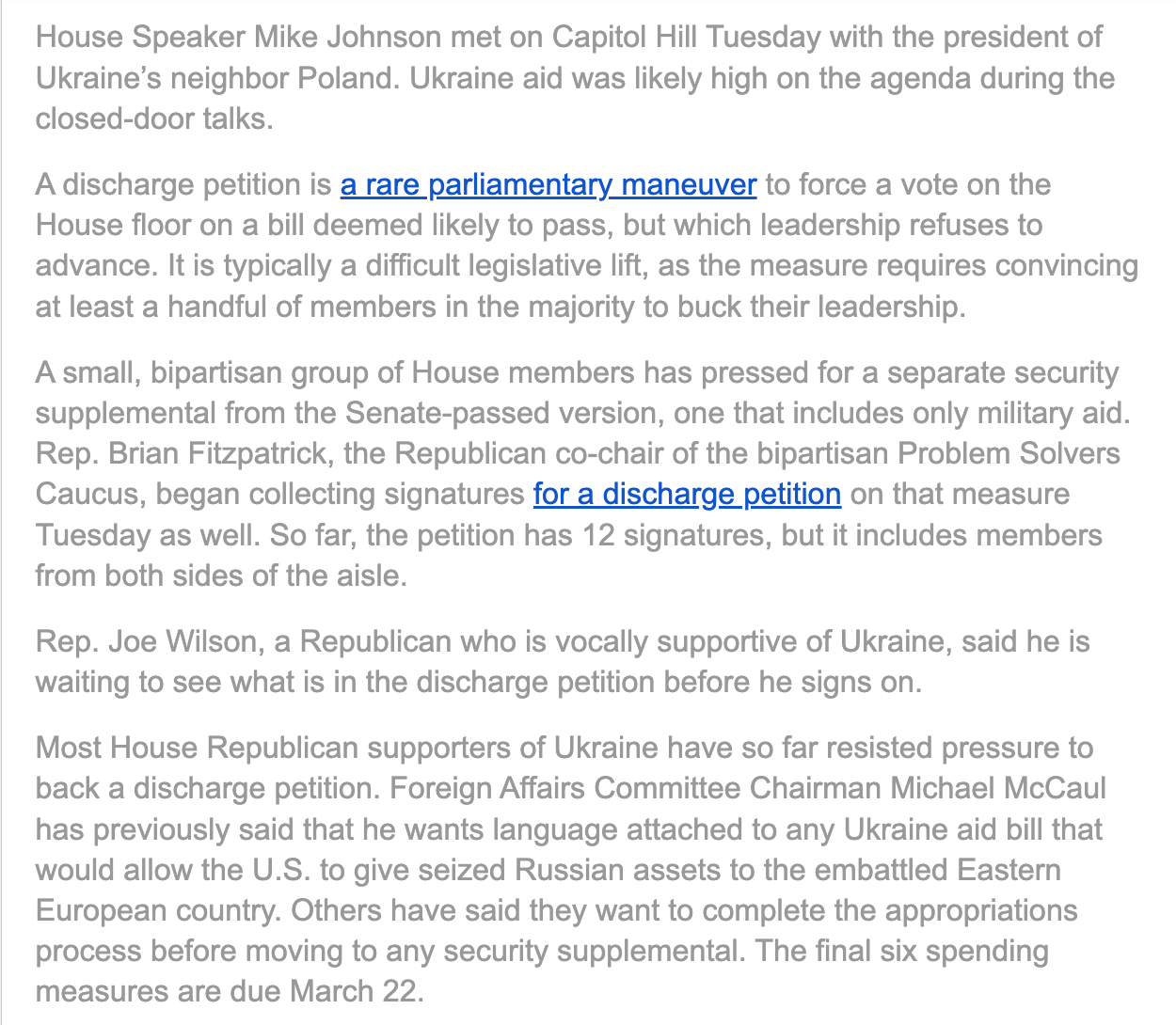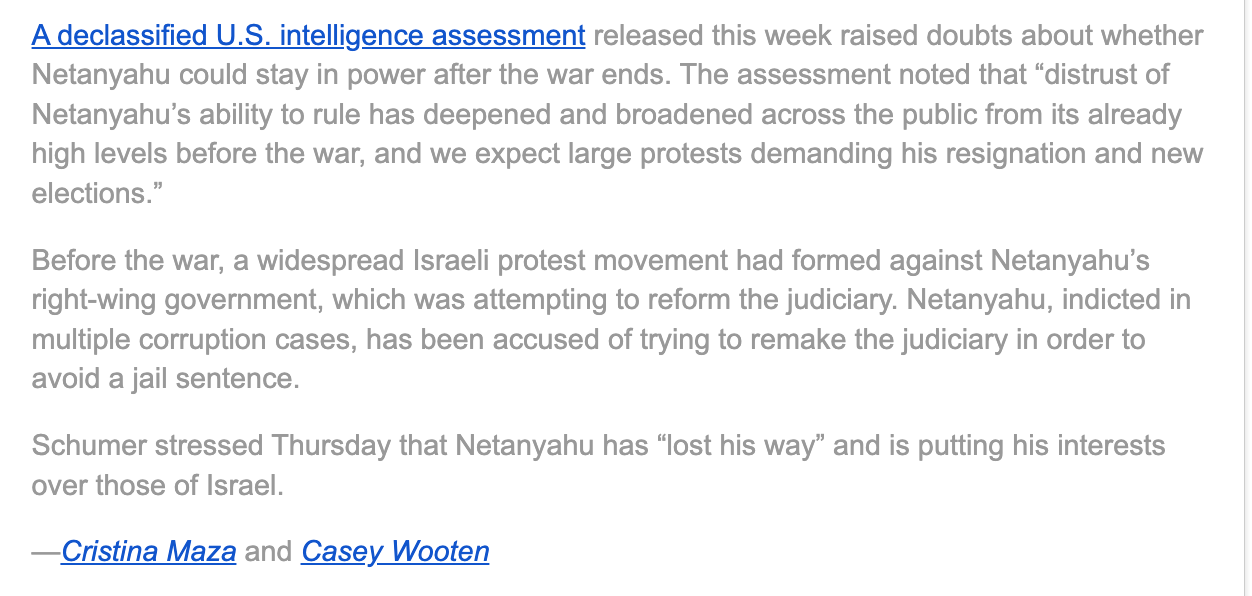Travel tips from Poland's Foreign Minister.
"All borders in Europe are artificial."
Greetings, all! It’s been a busy week, so this is just a short Sunday note. The EU recommended opening accession talks with Bosnia, Geert Wilders will not be the next Dutch PM, Catalunya will hold snap elections, and the EU is penning a controversial migration deal with Egypt, and that’s just a tiny fraction of the week’s news items. Skip down to the ‘What I’m reading’ section for more on that.
On Tuesday morning, I attended a breakfast organized by my former colleagues at the Christian Science Monitor with Poland’s Foreign Minister Radek Sikorski. He’s been a prominent political figure in Poland and the European Union for decades.
The conversation lasted an hour, and some of his comments are in my article for National Journal about a high-level Polish delegation to Washington this week. But something he said about Europe’s borders, identity, and war stuck with me. Not only because nationalism and Europe’s borders are topics I’ve obsessed over for decades, but because what he said was an example of the kind of story I hope to highlight with Lazo Magazine. This is what Sikorksi said when arguing that the transatlantic community is about respect for borders:
All borders in Europe are artificial. All of them. Even an island nation like the UK. The border in Ulster is an artificial border that is an accident of history.
Everywhere in Europe you have people of different cultures and languages living across an international boundary, everywhere. And we used to have wars over this kind of stuff.
But we've agreed after two World Wars, that actually the way to manage it is to give everyone the cultural and linguistic rights that they asked for.
I spent my skiing holidays in the Italian Dolomites, which I recommend to you. You get German management of the ski slopes and Italian food, not the other way around.
The Italians call it Alto-Adige. Germans call it South Tyrol (Südtirol). The majority language is German. And there used to be vicious wars there. Some hundreds of thousands of people died fighting up in the mountains during World War One. There was even terrorism as late as the 1960s there.
Now it's a heaven on earth because people decided, actually, you [can] have a street sign in three languages. There's also a local language called Dolomite Ladino, which is descended from Latin, which is a kind of mountaineer Latin. Why does it bother us? Let there be three signs. That's the European way, and [Russian President Vladimir] Putin is trying to do it the 19th-century way. And we've seen this movie, and we know where it leads, and we don't want it.
What I’m writing:
• I wrote a deep dive into Polish leadership's trip to Washington, their message to the U.S., and how Poland's trajectory has split from Hungary's. This story is unlocked and free to read.
• I spoke to Dmitryo Finashyn, a 29-year-old second lieutenant in Ukraine's National Guard, about Russia's invasion and why it's similar to the Lord of the Rings. "That is not just a metaphor," he told me. This interview is free to read.
Weekly news blurbs:
What I’m reading:
• Berlin Techno has received UNESCO cultural heritage status, Resident Advisor reports.
• The tale of the small, gold Buddha begins more than 200 years ago when a goldsmith crafts it for the court of the Cambodian king. It ends — as far as it’s possible to tell — in 2018, when István Zelnik, a Hungarian former diplomat with a penchant for antiques, puts it up for sale on an online auction site. Politico Europe has the story.
• With a dispatch from the Crimean peninsula, the Guardian reports that ten years on from Russia’s annexation, authorities are increasing a crackdown on pro-Ukrainian voices.
• Russia appears on track to produce nearly three times more artillery munitions than the U.S. and Europe, a key advantage ahead of what is expected to be another Russian offensive in Ukraine later this year, CNN reports.
• A Royal Air Force plane carrying British Defense Secretary Grant Schapps on Wednesday had its GPS signal jammed while flying close to Kaliningrad, a Russian exclave on the Baltic, the BBC reports.
• Ukraine's desperate hunt for troops prompted 14 Ukrainian MPs to take a page from the Russian playbook and propose a bill that would allow prisoners to serve in the military. Politico Europe has the write-up.
• In February, the Czech Republic proposed buying ammunition for Ukraine from third countries due to the EU’s lack of ammunition production capacity. Now officials say ammunition bought under the Czech initiative could reach Ukrainian battlefields in June, Euractiv reports.
• A top aide to the late Russian opposition leader Alexei Navalny, Leonid Volkov, was beaten and sprayed with tear gas as he was pulling up to his home in Lithuania’s capital, the New York Times reports.
• The European Union is “prepared to respond swiftly” with “new and significant measures against Iran” amid reports that Tehran may transfer ballistic missiles to Russia for use against Ukraine, according to a draft text seen by Reuters.
• Armenia is making a major pivot away from the Kremlin and toward the West, even hinting it may want to try and join the EU, Politico Europe reports.
• Deputy Assistant Secretary of State Gabriel Escobar said Kosovo’s controversial decision to regulate the use of the Serbian dinar in northern Kosovo caused problems for some citizens in the region and challenges for the U.S.-Kosovo relationship, Radio Free Europe reports.
• The European Union’s executive arm will recommend that member countries open membership negotiations with Bosnia-Herzegovina despite lingering ethnic divisions in the Western Balkan country, the Associated Press reports.
• Hungary summoned its U.S. ambassador for an “urgent” meeting following President Biden’s remarks about Hungarian Prime Minister Viktor Orbán wanting to run a “dictatorship,” Politico Europe reports.
• The U.S. ambassador to Hungary said Washington will act in response to Budapest’s “dangerously unhinged anti-American messaging” and “expanding relationship with Russia,” the Guardian reports.
• Thousands of people took to the streets of Slovakia’s capital, Bratislava, to show support for Ukraine and protest against the Slovak government, Reuters reports.
• The European Broadcasting Union said that a Slovak government proposal for Radio and Television Slovakia (RTVS) “threatens media independence.” “This appears to be a thinly veiled attempt to turn the Slovak public service broadcaster into state-controlled media,” the statement reads. Slovakia’s government wants to replace RTVS with a new body headed by political appointees.
• Portugal’s center-right Democratic Alliance coalition claimed victory in a close snap election in which the far right surged, and no party secured a majority of seats in parliament, Politico Europe reports.
• Far-right Dutch politician Geert Wilders renounced his claim to become the next prime minister of the Netherlands, Politico Europe reports.
• Spanish Prime Minister Pedro Sánchez said he would propose “granting Spain’s recognition for the Palestinian state,” the Associated Press reports.
• Sweden and Canada said they will resume aid payments to UNRWA, the UN agency for Palestinian refugees, the BBC reports. The Australian government later announced it would also resume funding.
• Palestinian medical staff in Gaza have told the BBC they were blindfolded, detained, forced to strip, and repeatedly beaten by Israeli troops after a raid at Nasser Hospital last month.
• Thousands of people took to the streets of Tel Aviv to protest the exemption of ultra-Orthodox from mandatory military service, the Times of Israel reports.
• The Biden administration announced sanctions on two West Bank settler outposts, marking the first time that economic restrictions have been placed on entire Israeli outposts in the Palestinian territory.
• A chorus of calls from leading nongovernmental organizations in Kyrgyzstan is demanding that President Sadyr Japarov veto a controversial bill modeled on Russia’s repressive “foreign agents” laws, Radio Free Europe reports.
• Haiti’s Prime Minister Ariel Henry agreed to resign following weeks of mounting pressure and a surge of gang violence in the country, NBC News reports.
• India announced rules that would allow it to implement a controversial citizenship bill that excludes Muslims, CNN reports.
• Senegal’s opposition leader, Ousmane Sonko, and the presidential candidate he is supporting in this month’s delayed election, Bassirou Diomaye Faye, were released from prison following an amnesty announced by President Micky Sall, the BBC reports.
You can write to me for any reason: c.maza@protonmail.com











